4 aug 2014
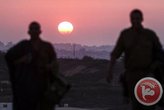
Palestinian factions and Israel have agreed to a 72-hour ceasefire starting from 8 a.m. on Tuesday, sources close to talks in Egypt said Monday.
"Egypt's contacts with relevant parties have achieved a commitment for a 72-hour truce in Gaza starting from 0500 GMT tomorrow morning, and an agreement for the rest of the relevant delegations to come to Cairo to conduct further negotiations," a senior official in Egypt told AFP.
"The Palestinians have agreed to a ceasefire proposed by Egypt," Azzam al-Ahmed, leader of the Palestinian delegation, told reporters in Cairo.
Earlier, sources close to the talks told Ma'an that Palestinian factions agreed to a three-day ceasefire which they said is likely to pave the way for a full cessation to fighting.
Representatives from Palestinian factions, including Hamas and Islamic Jihad, held their first official meeting on Monday after a Palestinian delegation agreed Sunday to joint demands to present to Egyptian mediators.
"There is a consensus among all the Palestinian factions that Gaza can't return to a blockade... it is a natural right of the people of Gaza to live (freely) as any other people in the world," senior Hamas official, and member of the Palestinian delegation, Ezzat al-Rishq, said.
Azzam al-Ahmed also expressed hope that Israel may still send a team to Cairo.
This could help "Egypt perform its role in halting the (Israeli) aggression and achieving the Palestinian demands through negotiations it is conducting with the two sides," he told reporters.
On Sunday, Palestinian factions agreed on "a ceasefire; Israeli troop withdrawal from Gaza; the end of the siege of Gaza and opening its border crossings," said Maher al-Taher, a member of the delegation.
The Palestinian demands also include fishing rights up to 12 nautical miles off Gaza's coast and the release of Palestinian prisoners demanded by Hamas and Abbas, said Taher, a senior official with the Democratic Front for the Liberation of Palestine.
Cairo, a traditional broker in Palestinian-Israeli conflicts, has moved to isolate Hamas on its eastern border after the Egyptian military overthrew the Islamist government last year.
Israel's assault on Gaza has killed over 1,800 Palestinians, far surpassing the death toll in Operation Cast Lead.
"Egypt's contacts with relevant parties have achieved a commitment for a 72-hour truce in Gaza starting from 0500 GMT tomorrow morning, and an agreement for the rest of the relevant delegations to come to Cairo to conduct further negotiations," a senior official in Egypt told AFP.
"The Palestinians have agreed to a ceasefire proposed by Egypt," Azzam al-Ahmed, leader of the Palestinian delegation, told reporters in Cairo.
Earlier, sources close to the talks told Ma'an that Palestinian factions agreed to a three-day ceasefire which they said is likely to pave the way for a full cessation to fighting.
Representatives from Palestinian factions, including Hamas and Islamic Jihad, held their first official meeting on Monday after a Palestinian delegation agreed Sunday to joint demands to present to Egyptian mediators.
"There is a consensus among all the Palestinian factions that Gaza can't return to a blockade... it is a natural right of the people of Gaza to live (freely) as any other people in the world," senior Hamas official, and member of the Palestinian delegation, Ezzat al-Rishq, said.
Azzam al-Ahmed also expressed hope that Israel may still send a team to Cairo.
This could help "Egypt perform its role in halting the (Israeli) aggression and achieving the Palestinian demands through negotiations it is conducting with the two sides," he told reporters.
On Sunday, Palestinian factions agreed on "a ceasefire; Israeli troop withdrawal from Gaza; the end of the siege of Gaza and opening its border crossings," said Maher al-Taher, a member of the delegation.
The Palestinian demands also include fishing rights up to 12 nautical miles off Gaza's coast and the release of Palestinian prisoners demanded by Hamas and Abbas, said Taher, a senior official with the Democratic Front for the Liberation of Palestine.
Cairo, a traditional broker in Palestinian-Israeli conflicts, has moved to isolate Hamas on its eastern border after the Egyptian military overthrew the Islamist government last year.
Israel's assault on Gaza has killed over 1,800 Palestinians, far surpassing the death toll in Operation Cast Lead.
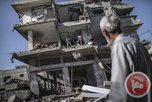
Palestinian factions have agreed to a 72-hour ceasefire starting from 8 a.m. on Tuesday, sources close to talks in Egypt told Ma'an on Monday.
Palestinian officials involved in the Cairo talks said that the three-day ceasefire agreement is likely to pave the way for a full cessation to fighting, which has killed over 1,800 Palestinians.
Representatives from Palestinian factions, including Hamas and Islamic Jihad, held their first official meeting on Monday after a Palestinian delegation agreed Sunday to joint demands to present to Egyptian mediators.
Cairo will then relay the demands to Israel, which baulked at sending negotiators after accusing Hamas of breaching a 72-hour truce moments after it began on Friday.
"There is a consensus among all the Palestinian factions that Gaza can't return to a blockade... it is a natural right of the people of Gaza to live (freely) as any other people in the world," senior Hamas official, and member of the Palestinian delegation, Ezzat al-Rishq, said.
Azzam al-Ahmed, who is heading the Palestinian delegation, also expressed hope that Israel may still send a team to Cairo.
This could help "Egypt perform its role in halting the (Israeli) aggression and achieving the Palestinian demands through negotiations it is conducting with the two sides," he told reporters.
On Sunday, Palestinian factions agreed on "a ceasefire; Israeli troop withdrawal from Gaza; the end of the siege of Gaza and opening its border crossings," said Maher al-Taher, a member of the delegation.
The Palestinian demands also include fishing rights up to 12 nautical miles off Gaza's coast and the release of Palestinian prisoners demanded by Hamas and Abbas, said Taher, a senior official with the Democratic Front for the Liberation of Palestine.
Cairo, a traditional broker in Palestinian-Israeli conflicts, has moved to isolate Hamas on its eastern border after the Egyptian military overthrew the Islamist government last year.
Israel's assault on Gaza has killed over 1,800 Palestinians, far surpassing the death toll in Operation Cast Lead.
Palestinian officials involved in the Cairo talks said that the three-day ceasefire agreement is likely to pave the way for a full cessation to fighting, which has killed over 1,800 Palestinians.
Representatives from Palestinian factions, including Hamas and Islamic Jihad, held their first official meeting on Monday after a Palestinian delegation agreed Sunday to joint demands to present to Egyptian mediators.
Cairo will then relay the demands to Israel, which baulked at sending negotiators after accusing Hamas of breaching a 72-hour truce moments after it began on Friday.
"There is a consensus among all the Palestinian factions that Gaza can't return to a blockade... it is a natural right of the people of Gaza to live (freely) as any other people in the world," senior Hamas official, and member of the Palestinian delegation, Ezzat al-Rishq, said.
Azzam al-Ahmed, who is heading the Palestinian delegation, also expressed hope that Israel may still send a team to Cairo.
This could help "Egypt perform its role in halting the (Israeli) aggression and achieving the Palestinian demands through negotiations it is conducting with the two sides," he told reporters.
On Sunday, Palestinian factions agreed on "a ceasefire; Israeli troop withdrawal from Gaza; the end of the siege of Gaza and opening its border crossings," said Maher al-Taher, a member of the delegation.
The Palestinian demands also include fishing rights up to 12 nautical miles off Gaza's coast and the release of Palestinian prisoners demanded by Hamas and Abbas, said Taher, a senior official with the Democratic Front for the Liberation of Palestine.
Cairo, a traditional broker in Palestinian-Israeli conflicts, has moved to isolate Hamas on its eastern border after the Egyptian military overthrew the Islamist government last year.
Israel's assault on Gaza has killed over 1,800 Palestinians, far surpassing the death toll in Operation Cast Lead.

Medics remove a child from the rubble after the Israeli airstrike in Shaati camp
Official Press Release -- Gaza Ministry of Health
The Ministry of Health Gaza condemns in the strongest possible terms the Israeli breaking of the humanitarian ceasefire in a murderous attack on the Al-Bakri family home in Al-Shaati refugee camp in west Gaza City, killing an eight-year-old child and injuring 30 other people, mostly women and children.
This attack on a home in one of the most densely populated residential areas on earth only minutes after the commencement of a humanitarian ceasefire can only be seen as a calculated and deliberate attack on civilians.
This attack can only be seen as calculated and cynical disregard for the ceasefire agreement – the same cynical disregard Israelis have evidenced towards each and every agreement they have ever signed, whether ceasefire, international convention, treaty or peace agreement.
This attack in breach of all legal and humanitarian law can only be seen as yet another example of the complete contempt and disdain in which the Israeli authorities hold all standards of civilised behaviour, organisations and instruments of international law, and humanity itself.
This attack comes amid the ongoing massacre in Rafah in which at least 170 have already lost their lives, as the death toll continues to rise.
Since July 7 more than 1,800 Gazans have been killed and almost 10,000 injured, the vast majority of them women, children and the elderly.
Its own actions in the past four weeks have stripped the thin mask of civility from the Israeli face, and revealed its abject savagery to the world.
In the name of humanity, the Ministry of Health Gaza demands that the international community act immediately to end the slaughter of innocents in Gaza, and hold the Israeli war criminals to account.
Official Press Release -- Gaza Ministry of Health
The Ministry of Health Gaza condemns in the strongest possible terms the Israeli breaking of the humanitarian ceasefire in a murderous attack on the Al-Bakri family home in Al-Shaati refugee camp in west Gaza City, killing an eight-year-old child and injuring 30 other people, mostly women and children.
This attack on a home in one of the most densely populated residential areas on earth only minutes after the commencement of a humanitarian ceasefire can only be seen as a calculated and deliberate attack on civilians.
This attack can only be seen as calculated and cynical disregard for the ceasefire agreement – the same cynical disregard Israelis have evidenced towards each and every agreement they have ever signed, whether ceasefire, international convention, treaty or peace agreement.
This attack in breach of all legal and humanitarian law can only be seen as yet another example of the complete contempt and disdain in which the Israeli authorities hold all standards of civilised behaviour, organisations and instruments of international law, and humanity itself.
This attack comes amid the ongoing massacre in Rafah in which at least 170 have already lost their lives, as the death toll continues to rise.
Since July 7 more than 1,800 Gazans have been killed and almost 10,000 injured, the vast majority of them women, children and the elderly.
Its own actions in the past four weeks have stripped the thin mask of civility from the Israeli face, and revealed its abject savagery to the world.
In the name of humanity, the Ministry of Health Gaza demands that the international community act immediately to end the slaughter of innocents in Gaza, and hold the Israeli war criminals to account.
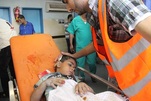
Child wounded in Gaza
On Monday afternoon, Israeli attacks in different parts of Gaza continued – despite a unilateral declaration by Israel that they would pause their attacks for 7 hours on Monday. At least 30 people were killed by Israeli forces on Monday, with attacks taking place in all parts of the Gaza Strip.
update:
An additional two Palestinians were killed by Israeli forces Monday evening. They were identified as:
Fayez Ismail Abu Hamad, 34, Khan Younis.
Saleh Ahmad al-Ghouti, 22, Rafah.
In Rafah, an Israeli airstrike took the lives of two siblings, who were identified as:
Mohammad Amjad Awida’, age 12, and
Amal Amjad Awida’, age 5.
Another shelling in Rafah killed one person and wounded 11. The person killed was identified as:
Karam Mahrous Dahir, 24.
In Gaza City, two people who were killed by Israeli airstrikes were brought to Shifa Hospital, identified as:
Ibrahim al-Masharawi, 30 years
Ebtisam al-Bakri, 38 years
Another member of the al-Bakri family, an 8-year old child, was killed earlier on Monday after an Israeli airstrike on the family home. Ebtisam was critically wounded in the same attack and died of her injuries several hours later.
Medical sources at Nassar Hospital, in Khan Younis, report the arrival of the corpses of two people killed by Israeli attacks in the southern part of the Gaza Strip. They were identified as:
Mahmoud Zaki al-Laham, 25
Ahmad Abdel-Halim Mohammad al-Astal, 26.
In addition, the Palestinian Ministry of Health reports the recovery of 32 bodies from different parts of Gaza who were buried under the rubble from Israeli bombings over the past several days.
This takes the death toll of Palestinians killed since the Israeli invasion began on July 8th to 1865 killed, with 9470 wounded, an estimated 30% of whom will be crippled for life or face debilitating disabilities due to their injuries, according to the Ministry of Health.
On Monday afternoon, Israeli attacks in different parts of Gaza continued – despite a unilateral declaration by Israel that they would pause their attacks for 7 hours on Monday. At least 30 people were killed by Israeli forces on Monday, with attacks taking place in all parts of the Gaza Strip.
update:
An additional two Palestinians were killed by Israeli forces Monday evening. They were identified as:
Fayez Ismail Abu Hamad, 34, Khan Younis.
Saleh Ahmad al-Ghouti, 22, Rafah.
In Rafah, an Israeli airstrike took the lives of two siblings, who were identified as:
Mohammad Amjad Awida’, age 12, and
Amal Amjad Awida’, age 5.
Another shelling in Rafah killed one person and wounded 11. The person killed was identified as:
Karam Mahrous Dahir, 24.
In Gaza City, two people who were killed by Israeli airstrikes were brought to Shifa Hospital, identified as:
Ibrahim al-Masharawi, 30 years
Ebtisam al-Bakri, 38 years
Another member of the al-Bakri family, an 8-year old child, was killed earlier on Monday after an Israeli airstrike on the family home. Ebtisam was critically wounded in the same attack and died of her injuries several hours later.
Medical sources at Nassar Hospital, in Khan Younis, report the arrival of the corpses of two people killed by Israeli attacks in the southern part of the Gaza Strip. They were identified as:
Mahmoud Zaki al-Laham, 25
Ahmad Abdel-Halim Mohammad al-Astal, 26.
In addition, the Palestinian Ministry of Health reports the recovery of 32 bodies from different parts of Gaza who were buried under the rubble from Israeli bombings over the past several days.
This takes the death toll of Palestinians killed since the Israeli invasion began on July 8th to 1865 killed, with 9470 wounded, an estimated 30% of whom will be crippled for life or face debilitating disabilities due to their injuries, according to the Ministry of Health.
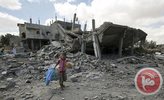
A Palestinian child carries a ball and bird cage as he walks on the rubble of a building close to the Rafah refugee camp, in southern Gaza Strip, on August 4, 2014
Two children were killed Monday evening in an Israeli airstrike on Rafah, with at least 21 Palestinians killed across the besieged enclave during the day.
Mohammad Amjad Oweida, 12, and Amal Amjad Oweida, 5, were killed after an Israeli airstrike hit their house in the al-Barazil neighborhood in Rafah while they were playing on a rooftop.
Gaza health ministry spokesman Ashraf al-Qidra said 32 bodies were recovered on Monday and at least 21 Palestinians reported killed.
Earlier, Israeli Prime Minister Benjamin Netanyahu said "the campaign in Gaza is continuing" following the end of a seven-hour humanitarian lull.
The unilateral truce was announced as international outrage grew over an Israeli strike near a UN school on Sunday that killed 10 people, among them refugees who had been seeking shelter.
It was the third such strike in 10 days.
With UN figures indicating most of the 1,865 people killed in Gaza so far were civilians, the world has stepped up its demands for an end to the bloodshed.
Bloodshed in Jerusalem
In Jerusalem, meanwhile, one Israeli was killed and five hurt when a Palestinian rammed an earth-mover into a bus, turning it over before the driver was shot dead by police, according to Israeli officials.
Shortly afterwards, an Israeli soldier was shot and seriously wounded near a bus stop not far from the site of the earlier attack, with police combing the area for his attacker.
Police said the attack on the bus was a "terrorist attack," saying the driver was a Palestinian from annexed East Jerusalem.
An crowd of angry Israelis gathered at the scene, chanting "Death to Arabs" and dozens of people could be seen attacking a nearby bus filled with Palestinian workers.
Two children were killed Monday evening in an Israeli airstrike on Rafah, with at least 21 Palestinians killed across the besieged enclave during the day.
Mohammad Amjad Oweida, 12, and Amal Amjad Oweida, 5, were killed after an Israeli airstrike hit their house in the al-Barazil neighborhood in Rafah while they were playing on a rooftop.
Gaza health ministry spokesman Ashraf al-Qidra said 32 bodies were recovered on Monday and at least 21 Palestinians reported killed.
Earlier, Israeli Prime Minister Benjamin Netanyahu said "the campaign in Gaza is continuing" following the end of a seven-hour humanitarian lull.
The unilateral truce was announced as international outrage grew over an Israeli strike near a UN school on Sunday that killed 10 people, among them refugees who had been seeking shelter.
It was the third such strike in 10 days.
With UN figures indicating most of the 1,865 people killed in Gaza so far were civilians, the world has stepped up its demands for an end to the bloodshed.
Bloodshed in Jerusalem
In Jerusalem, meanwhile, one Israeli was killed and five hurt when a Palestinian rammed an earth-mover into a bus, turning it over before the driver was shot dead by police, according to Israeli officials.
Shortly afterwards, an Israeli soldier was shot and seriously wounded near a bus stop not far from the site of the earlier attack, with police combing the area for his attacker.
Police said the attack on the bus was a "terrorist attack," saying the driver was a Palestinian from annexed East Jerusalem.
An crowd of angry Israelis gathered at the scene, chanting "Death to Arabs" and dozens of people could be seen attacking a nearby bus filled with Palestinian workers.

Hamas' al-Qaqssam Brigades targeted Israeli soldiers in eastern Juhr al-Dik with three 120 mortar shells, the Zikim military site with two shells and Kfaz Azza with two others on Monday.
Meanwhile Islamic Jihad's Al-Quds Brigades targeted Ashkelon with five grad missiles.
The PRC's al-Nasser Salah al-Din Brigades targeted soldiers near the Zikim military site with four 107 missiles.
And the al-Mujahidin Brigades declared targeting Malaka with three 107 missiles, an Israeli vehicle with an RPG shell in eastern al-Shujaiyya, Ofokim military site with two grad missiles, and Eshkol with three 107 missiles.
Meanwhile Islamic Jihad's Al-Quds Brigades targeted Ashkelon with five grad missiles.
The PRC's al-Nasser Salah al-Din Brigades targeted soldiers near the Zikim military site with four 107 missiles.
And the al-Mujahidin Brigades declared targeting Malaka with three 107 missiles, an Israeli vehicle with an RPG shell in eastern al-Shujaiyya, Ofokim military site with two grad missiles, and Eshkol with three 107 missiles.
France's Hollande calls for action on Gaza 'massacres'
French President Francois Hollande called for action Monday to put an end to massacres in Gaza, where more than 1,800 Palestinians have died in Israeli attacks against Hamas.
"When I see what is happening with the Christians in Iraq, the minorities in Syria, massacres every day. What is happening too in Gaza, massacres. ... We have to act," Hollande said as he attended ceremonies to mark the 100th anniversary of the outbreak of World War I.
French President Francois Hollande called for action Monday to put an end to massacres in Gaza, where more than 1,800 Palestinians have died in Israeli attacks against Hamas.
"When I see what is happening with the Christians in Iraq, the minorities in Syria, massacres every day. What is happening too in Gaza, massacres. ... We have to act," Hollande said as he attended ceremonies to mark the 100th anniversary of the outbreak of World War I.

The Israeli army said on Monday it was resuming its strikes on the Gaza Strip, after the end of a seven-hour humanitarian lull.
"We are resuming our operations, including air strikes, against terrorist infrastructures in Gaza," spokesman Lieutenant Colonel Peter Lerner told AFP.
He said troops were redeploying within Gaza while other forces were pulling out in a process which began on Saturday.
PM: Gaza campaign to go on until calm restored to Israel
Israel will not stop its 28-day military campaign in Gaza until long-term calm is restored, Prime Minister Benjamin Netanyahu said Monday, shunning increasingly vocal world demands for a truce.
"The campaign in Gaza is continuing," he said at the end of a seven-hour humanitarian lull which saw violence subside in the battered enclave.
"This operation will only end when quiet and security is established for the citizens of Israel for a prolonged period."
"We are resuming our operations, including air strikes, against terrorist infrastructures in Gaza," spokesman Lieutenant Colonel Peter Lerner told AFP.
He said troops were redeploying within Gaza while other forces were pulling out in a process which began on Saturday.
PM: Gaza campaign to go on until calm restored to Israel
Israel will not stop its 28-day military campaign in Gaza until long-term calm is restored, Prime Minister Benjamin Netanyahu said Monday, shunning increasingly vocal world demands for a truce.
"The campaign in Gaza is continuing," he said at the end of a seven-hour humanitarian lull which saw violence subside in the battered enclave.
"This operation will only end when quiet and security is established for the citizens of Israel for a prolonged period."
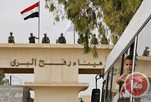
When Egypt proposed a truce on July 14, the number of Palestinians killed in Gaza was around 200, but the number is almost 2,000 now in addition to some 8,000 injuries and more than 300,000 displaced, says Egypt’s ambassador to Palestine.
Wael Nasr Addin Atiyeh added in a statement Monday that Gaza was facing a humanitarian disaster.
Egypt, he added, has opened the Rafah crossing permanently during the last 30 days to allow entry of injured people. He urged “all sides to avoid creating problems to impede entry of injured Palestinians through the crossing.”
The Egyptian ambassador added that Egypt would be ready to host any number of patients and injured people and treat them in hospitals in El-Arish, Ismailyya and Cairo for free.
For a few weeks, added Atiyeh, Egypt has sent 20 fully-equipped ambulances to the Rafah crossing to evacuate injured Gazans. In addition, an aid station has been set up near the main gate of the Rafah crossing with 30 doctors from all specialties to help the injured people.
The statement went on to say that the Egyptian authorities adopted a mechanism to allow entry of humanitarian aid convoys from other countries into Gaza as quickly as possible.
Wael Nasr Addin Atiyeh added in a statement Monday that Gaza was facing a humanitarian disaster.
Egypt, he added, has opened the Rafah crossing permanently during the last 30 days to allow entry of injured people. He urged “all sides to avoid creating problems to impede entry of injured Palestinians through the crossing.”
The Egyptian ambassador added that Egypt would be ready to host any number of patients and injured people and treat them in hospitals in El-Arish, Ismailyya and Cairo for free.
For a few weeks, added Atiyeh, Egypt has sent 20 fully-equipped ambulances to the Rafah crossing to evacuate injured Gazans. In addition, an aid station has been set up near the main gate of the Rafah crossing with 30 doctors from all specialties to help the injured people.
The statement went on to say that the Egyptian authorities adopted a mechanism to allow entry of humanitarian aid convoys from other countries into Gaza as quickly as possible.
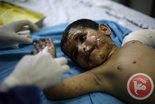
Lying on his bed in a Gaza hospital, three-year-old Yamin now sees the world from behind burns which have disfigured him for life.
The tiny boy is just one of thousands of burn victims and those wounded by Israeli shell fire overwhelming Gaza's sole working operating theater for plastic surgeons.
He also has burns on his back and multiple fractures suffered when an Israeli strike decimated his family and destroyed their home in al-Buraj, central Gaza, last week.
It was the evening. The start of Eid al-Fitr, the festival marking the end of the Muslim holy month of Ramadan.
In a single strike, the house was turned to rubble and 19 people lay dead. Yamin, miraculously, was the sole survivor but he was left an orphan and badly burnt.
He was taken to a clinic then rapidly transferred to the burns department at the Shifa hospital in Gaza, where he cries, lying naked, and where a handful of surgeons are now confronted with the endless horrors of the war.
Every day ambulances rush in with shattered lives: charred or bloodied humans who will die a few hours later on their stretchers.
The survivors transfer to an operating table, sometimes the modest one in the burns unit, the only one in the whole of Gaza that plastic surgeons can use.
Local medics say 1,829 Palestinians, mostly civilians according to the UN, have died since the latest confrontation between Israel and Hamas began on July 8.
Over 9,000 others have been hurt, many seriously.
"There are very few light injuries in this war," says Ghassan Abu Sitta, a plastic surgeon from the American University of Beirut, sent a week ago by the Medical Aid for Palestinians organization to help out in Gaza.
"My feeling is around 70 percent would have some kind of permanent deformity, either in terms of scarring or in terms of functional deformity. ... They will never be the same again."
His worst case? "An 8 year-old boy who basically lost half of his face including one eye and lost the other eye with shrapnel in it. What I needed to do is reconstruct the face just to cover the wounds.
"The eyes are lost. He lost all his family, his ability to care for himself has been completely destroyed. There is no future for him, he keeps asking why they have turned the lights off," Dr. Abu Sitta says.
"The size and the magnitude of the carnage that has affected Gaza is beyond the capacity of any health system, let alone a health system that has struggled with eight years of siege," says the surgeon, who was also in Gaza during Israel's 'Cast Lead' operation at the end of 2008 and start of 2009.
This time the fighting has caused more deaths and more wounded. And worse injuries.
"The fact that we are unable to evacuate patients outside Gaza means that all of these patients are inside the system," the surgeon says.
Then he turns away to perform a skin graft on a young man with a pierced foot and a four-inch crater on his calf, through which his tibia is visible.
Hospitals struck
For the past month, every day brings deliveries of bodies, wounded people and trauma to Gaza's hospitals.
"We are now looking at a health and humanitarian disaster," James Rawley, UN humanitarian coordinator for the Palestinian territories, said at the weekend.
A third of hospitals have been hit during the fighting and the violence has prevented nearly half of medical staff from reaching the clinics and health centers that are still standing.
"The current state of the health system is disastrous because the people are exhausted, many hospitals have been affected by the bombardments, and people are afraid to go to hospital," as sometimes shooting is taking place along their route, says Nicolas Palarus, head of operations in Gaza for Doctors Without Borders.
Palestinian medical staff, the backbone of the local health system, face "stress from the fighting, being far from the family, separated, widespread fatigue, lack of some medicines," he says.
"From primary healthcare to the big hospitals, the whole chain is disrupted. The system is in a catastrophic state," Palarus says.
On this day in the burns unit, medical workers paint an antibacterial ointment onto little Yamin, naked, frail and frightened. It will help his skin scar over.
But his cousin and her husband, now his guardians, interrupt. Maybe the best thing for the child, they say, would be to evacuate him from Gaza. To get him far away from the horrors of the war.
Bodies of 6 Palestinians pulled from Shujaiyya rubble
The bodies of six Palestinians were pulled from rubble on Monday in the Shujaiyya neighborhood of Gaza City, health ministry spokesman Ashraf al-Qidra said.
Al-Qidra said three of the bodies were partially decomposed because they were killed in Israeli attacks days earlier. He identified those three as Abdullah Mubarek, Walid Darbieh, and Amro Muhjiz.
He identified the other three as Muhammad Saleh Shamali, 60, Muhammad Fawzi Bhar, 22, and Muhammad Husni Sukkar, 20.
Bodies of 2 Palestinians pulled from rubble in Gaza City
The bodies of two Palestinians were pulled from rubble in Gaza City on Monday, health ministry spokesman Ashraf al-Qidra said.
They were identified as Ibrahim al-Mashharawi, 30, and Ibtisam al-Bakri, 38.
The tiny boy is just one of thousands of burn victims and those wounded by Israeli shell fire overwhelming Gaza's sole working operating theater for plastic surgeons.
He also has burns on his back and multiple fractures suffered when an Israeli strike decimated his family and destroyed their home in al-Buraj, central Gaza, last week.
It was the evening. The start of Eid al-Fitr, the festival marking the end of the Muslim holy month of Ramadan.
In a single strike, the house was turned to rubble and 19 people lay dead. Yamin, miraculously, was the sole survivor but he was left an orphan and badly burnt.
He was taken to a clinic then rapidly transferred to the burns department at the Shifa hospital in Gaza, where he cries, lying naked, and where a handful of surgeons are now confronted with the endless horrors of the war.
Every day ambulances rush in with shattered lives: charred or bloodied humans who will die a few hours later on their stretchers.
The survivors transfer to an operating table, sometimes the modest one in the burns unit, the only one in the whole of Gaza that plastic surgeons can use.
Local medics say 1,829 Palestinians, mostly civilians according to the UN, have died since the latest confrontation between Israel and Hamas began on July 8.
Over 9,000 others have been hurt, many seriously.
"There are very few light injuries in this war," says Ghassan Abu Sitta, a plastic surgeon from the American University of Beirut, sent a week ago by the Medical Aid for Palestinians organization to help out in Gaza.
"My feeling is around 70 percent would have some kind of permanent deformity, either in terms of scarring or in terms of functional deformity. ... They will never be the same again."
His worst case? "An 8 year-old boy who basically lost half of his face including one eye and lost the other eye with shrapnel in it. What I needed to do is reconstruct the face just to cover the wounds.
"The eyes are lost. He lost all his family, his ability to care for himself has been completely destroyed. There is no future for him, he keeps asking why they have turned the lights off," Dr. Abu Sitta says.
"The size and the magnitude of the carnage that has affected Gaza is beyond the capacity of any health system, let alone a health system that has struggled with eight years of siege," says the surgeon, who was also in Gaza during Israel's 'Cast Lead' operation at the end of 2008 and start of 2009.
This time the fighting has caused more deaths and more wounded. And worse injuries.
"The fact that we are unable to evacuate patients outside Gaza means that all of these patients are inside the system," the surgeon says.
Then he turns away to perform a skin graft on a young man with a pierced foot and a four-inch crater on his calf, through which his tibia is visible.
Hospitals struck
For the past month, every day brings deliveries of bodies, wounded people and trauma to Gaza's hospitals.
"We are now looking at a health and humanitarian disaster," James Rawley, UN humanitarian coordinator for the Palestinian territories, said at the weekend.
A third of hospitals have been hit during the fighting and the violence has prevented nearly half of medical staff from reaching the clinics and health centers that are still standing.
"The current state of the health system is disastrous because the people are exhausted, many hospitals have been affected by the bombardments, and people are afraid to go to hospital," as sometimes shooting is taking place along their route, says Nicolas Palarus, head of operations in Gaza for Doctors Without Borders.
Palestinian medical staff, the backbone of the local health system, face "stress from the fighting, being far from the family, separated, widespread fatigue, lack of some medicines," he says.
"From primary healthcare to the big hospitals, the whole chain is disrupted. The system is in a catastrophic state," Palarus says.
On this day in the burns unit, medical workers paint an antibacterial ointment onto little Yamin, naked, frail and frightened. It will help his skin scar over.
But his cousin and her husband, now his guardians, interrupt. Maybe the best thing for the child, they say, would be to evacuate him from Gaza. To get him far away from the horrors of the war.
Bodies of 6 Palestinians pulled from Shujaiyya rubble
The bodies of six Palestinians were pulled from rubble on Monday in the Shujaiyya neighborhood of Gaza City, health ministry spokesman Ashraf al-Qidra said.
Al-Qidra said three of the bodies were partially decomposed because they were killed in Israeli attacks days earlier. He identified those three as Abdullah Mubarek, Walid Darbieh, and Amro Muhjiz.
He identified the other three as Muhammad Saleh Shamali, 60, Muhammad Fawzi Bhar, 22, and Muhammad Husni Sukkar, 20.
Bodies of 2 Palestinians pulled from rubble in Gaza City
The bodies of two Palestinians were pulled from rubble in Gaza City on Monday, health ministry spokesman Ashraf al-Qidra said.
They were identified as Ibrahim al-Mashharawi, 30, and Ibtisam al-Bakri, 38.
|
|
|
Page: 93 - 92 - 91 - 90 - 89 - 88 - 87 - 86 - 85- 84 - 83 - 82 - 81 - 80 - 79 - 78 - 77 - 76 - 75 - 74
Truce violations List of names Pictures of martyrs
Days: Aug: 26 - 25 - 24 - 23 - 22 - 21 - 20 - 19 - 18 - 17 - 16 - 15 - 14 - 13 - 12 - 11 - 10 - 9 - 8 - 7 - 6 - 5 - 4 - 3 - 2 - 1
July: 31 - 30 - 29 - 28 - 27 - 26 - 25 - 24 - 23 - 22 - 21 - 20 - 19 - 18 - 17 - 16 - 15 - 14 - 13 - 12 - 11 - 10 - 9 - 8
Days: Aug: 26 - 25 - 24 - 23 - 22 - 21 - 20 - 19 - 18 - 17 - 16 - 15 - 14 - 13 - 12 - 11 - 10 - 9 - 8 - 7 - 6 - 5 - 4 - 3 - 2 - 1
July: 31 - 30 - 29 - 28 - 27 - 26 - 25 - 24 - 23 - 22 - 21 - 20 - 19 - 18 - 17 - 16 - 15 - 14 - 13 - 12 - 11 - 10 - 9 - 8
